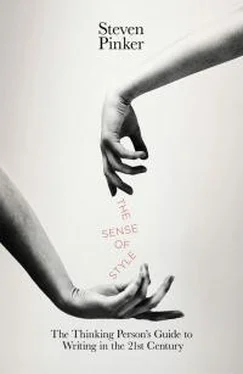Mayor Menino said the Turnpike Authority, which is responsible for the maintenance of the tunnel, had set up a committee to investigate the accident.
The final key to using sequences of tenses should be familiar from our discussion of if and then . The past-tense forms of can, will, and may are could, would, and might, and these are the forms to use in backshifting:
Amy can play the bassoon.
Amy
said
that she
could
play the bassoon.
Paul will leave on Tuesday.
Paul
said
that he
would
leave on Tuesday.
The Liberals may try to form a coalition government.
Sonia
said
that the Liberals
might
try to form a coalition government.
And the past tense of a past tense (the pluperfect) uses the auxiliary had, so when the backshifted verb refers to a past time, had is summoned into action:
He wrote it himself.
He
said
that he
had
written it himself.
It’s not obligatory, though; writers often simplify things by using the simple past tense in both places ( He said that he wrote it himself ), which (for complicated reasons) is technically consistent with the semantics of backshifting.
shall and will .According to another old rule, when speaking about an event in the future one must use shall in the first person ( I shall, we shall ) but will in the second and third person ( you will, he will, she will, they will ). But when expressing determination or permission, it’s the other way around. Thus Lillian Hellman, when she defied the House Un-American Activities Committee in 1952, properly declared I will not cut my conscience to fit this year’s fashions. Had her comrades been speaking on her behalf, they would have said She shall not cut her conscience to fit this year’s fashions.
The rule is suspiciously complicated for something as basic to everyday expression as future time, and it turns out not to be a rule at all. The authors of Merriam-Webster’s Dictionary of English Usage, having surveyed the uses of the two forms over six hundred years, conclude, “The traditional rules about shall and will do not appear to have described real usage of these words precisely at any time, although there is no question that they do describe the usage of some people some of the time and that they are more applicable in England than elsewhere.”
Even with some Englishmen some of the time, it can be hard to distinguish future time in the first person from determination in the first person because of the metaphysical peculiarity of future time: no one knows what the future will bring, but we can choose to try to affect it. 21When Churchill said, “We shall fight on the beaches, we shall fight on the landing grounds, … we shall never surrender,” was he fiercely proclaiming the determination of the British people, or was he calmly prophesying a future that was certain because of the determination of the British people?
With everyone else—the Scots, Irish, Americans, and Canadians (other than those with traditional English schooling)—the rule about shall and will never applied. In his manual Plain Words, Ernest Gowers wrote, “The story is a very old one of the drowning Scot who was misunderstood by English onlookers and left to his fate because he cried, ‘I will drown and nobody shall save me!’” Outside England (and for a growing number of speakers there as well), shall sounds prissy as an expression of future tense: no one says I shall pick up the toilet paper at Walmart this afternoon . And when shall is used at all, particularly in the first person, it tends to defy the rule and convey non -future senses such as permission ( Shall we dance? ) and determination (as in General Douglas MacArthur’s famous declaration “I shall return” and the civil rights anthem “We Shall Overcome”). As Copperud wrote, “ Shall, then, seems well on the way to extinction, much like the hapless Scot.”
split infinitives.Most mythical usage rules are merely harmless. The prohibition of split infinitives (as in Are you sure you want to permanently delete all the items and subfolders in the “Deleted Items” folder? ) and the even more sweeping prohibition of “split verbs” (as in I will always love you and I would never have guessed ) is downright pernicious. Good writers who have been brainwashed into unsplitting their infinitives can come out with monstrosities such as these:
Hobbes concluded that the only way out of the mess is for everyone permanently to surrender to an authoritarian ruler.
David Rockefeller, a member of the Harvard College Class of 1936 and longtime University benefactor, has pledged $100 million to increase dramatically learning opportunities for Harvard undergraduates through international experiences and participation in the arts. 22
The split-verb superstition can even lead to a crisis of governance. During the 2009 presidential inauguration, Chief Justice John Roberts, a famous stickler for grammar, could not bring himself to have Barack Obama “solemnly swear that I will faithfully execute the office of president of the United States.” Abandoning his strict constructionism, Roberts unilaterally amended the Constitution and had Obama “solemnly swear that I will execute the office of president to the United States faithfully.” The garbled oath raised fears about whether the transfer of power had been legitimate, and so they repeated the oath verbatim, split verb and all, in a private meeting later that afternoon.
The very terms “split infinitive” and “split verb” are based on a thick-witted analogy to Latin, in which it is impossible to split a verb because it consists of a single word, such as amare, “to love.” But in English, the so-called infinitive to write consists of two words, not one: the subordinator to and the plain form of the verb write, which can also appear without to in constructions such as She helped him pack and You must be brave. 23Similarly, the allegedly unsplittable verb will execute is not a verb at all but two verbs, the auxiliary verb will and the main verb execute.
There is not the slightest reason to interdict an adverb from the position before the main verb, and great writers in English have placed it there for centuries. 24Indeed, the spot in front of the main verb is often the most natural resting place for an adverb. Sometimes it is the only resting place, particularly when the modifier is a negation or quantifier such as not or more than. (Recall from chapter 5 that the placement of not affects its logical scope and thus the meaning of the sentence.) In each of the examples below, unsplitting the infinitive either changes the sense or leads to garble:
The policy of the Army at that time was
to not send
women into combat roles.
25
The policy of the Army at that time was
not to send
women into combat roles.
I’m moving to France
to not get
fat [caption of a
New Yorker
cartoon].
26
I’m moving to France
not to get
fat.
Profits are expected
to more than double
next year.
27
Profits are expected
more than to double
next year.
More generally, the preverbal position is the only one in which the adverb unambiguously modifies the verb. In a sentence in which the author may have taken pains to unsplit an infinitive, such as The board voted immediately to approve the casino , the reader has to wonder whether it was the vote that was immediate, or the approval. With the infinitive left unsplit— The board voted to immediately approve the casino —it can only be the approval.
Читать дальше












